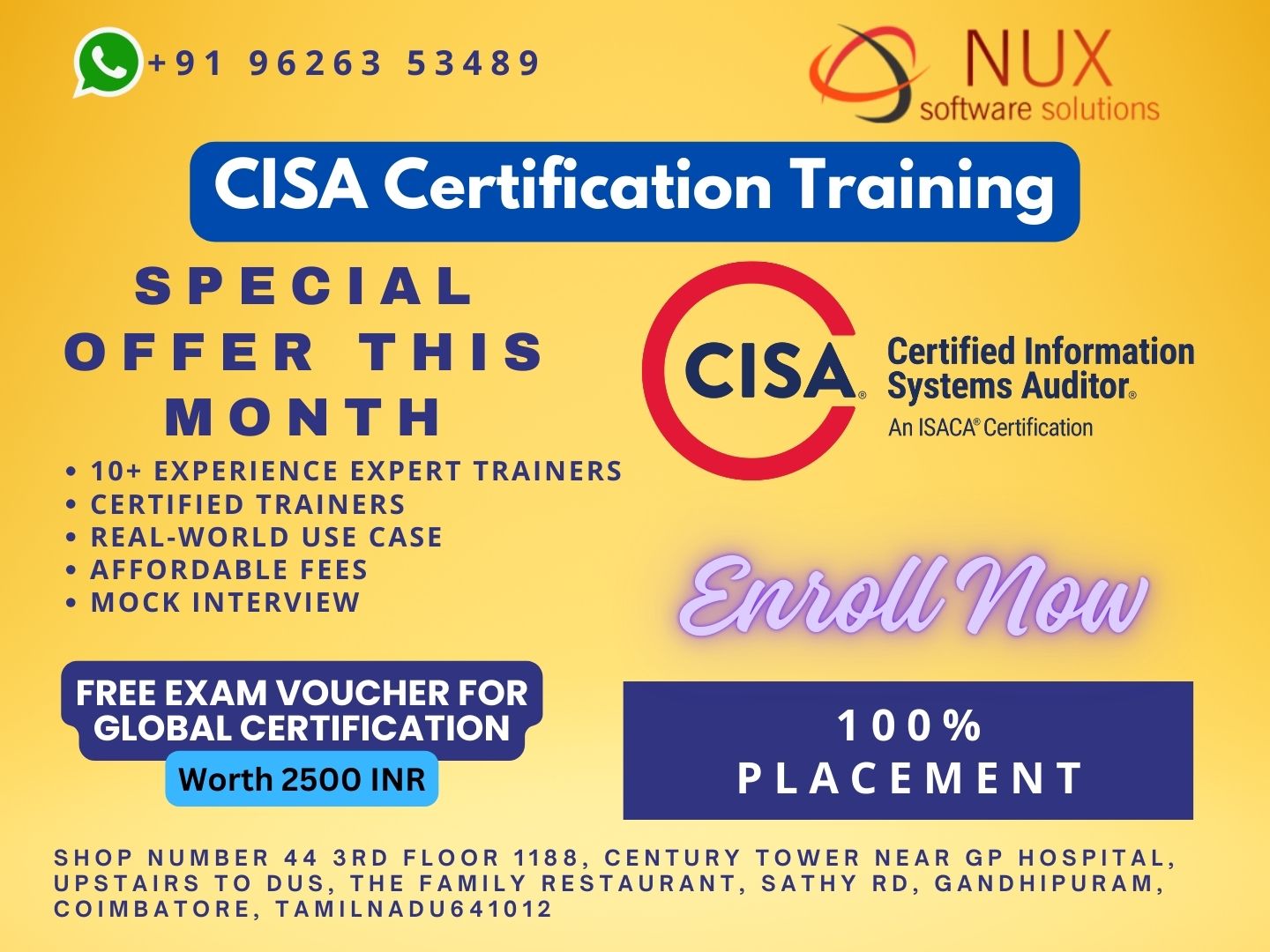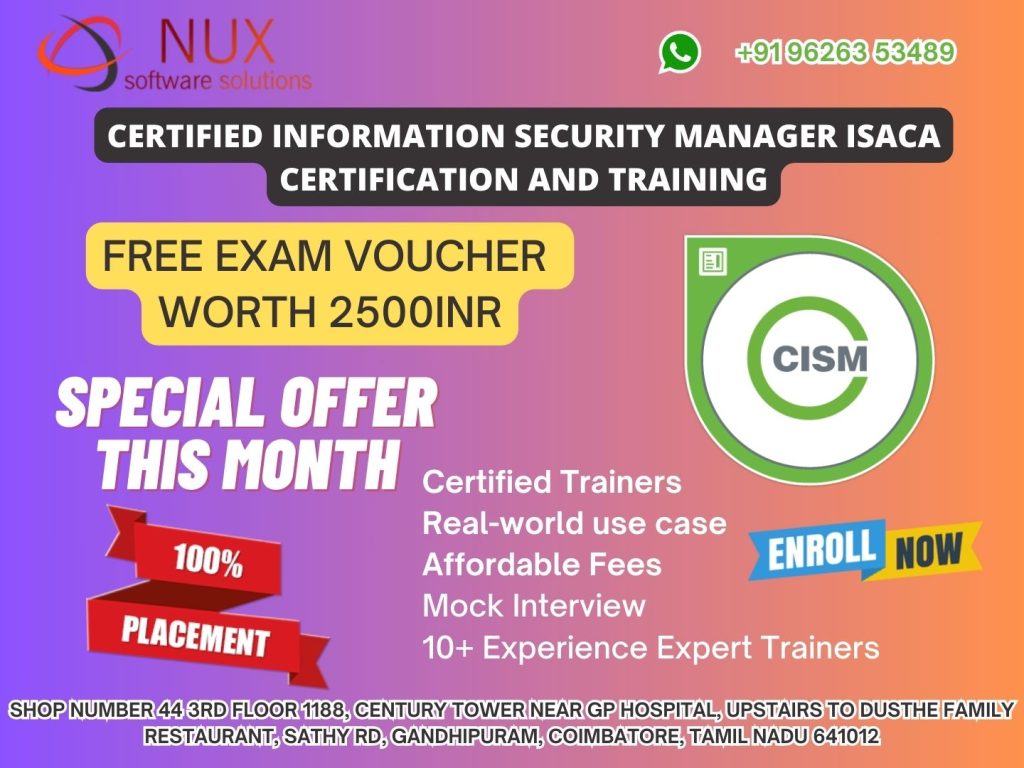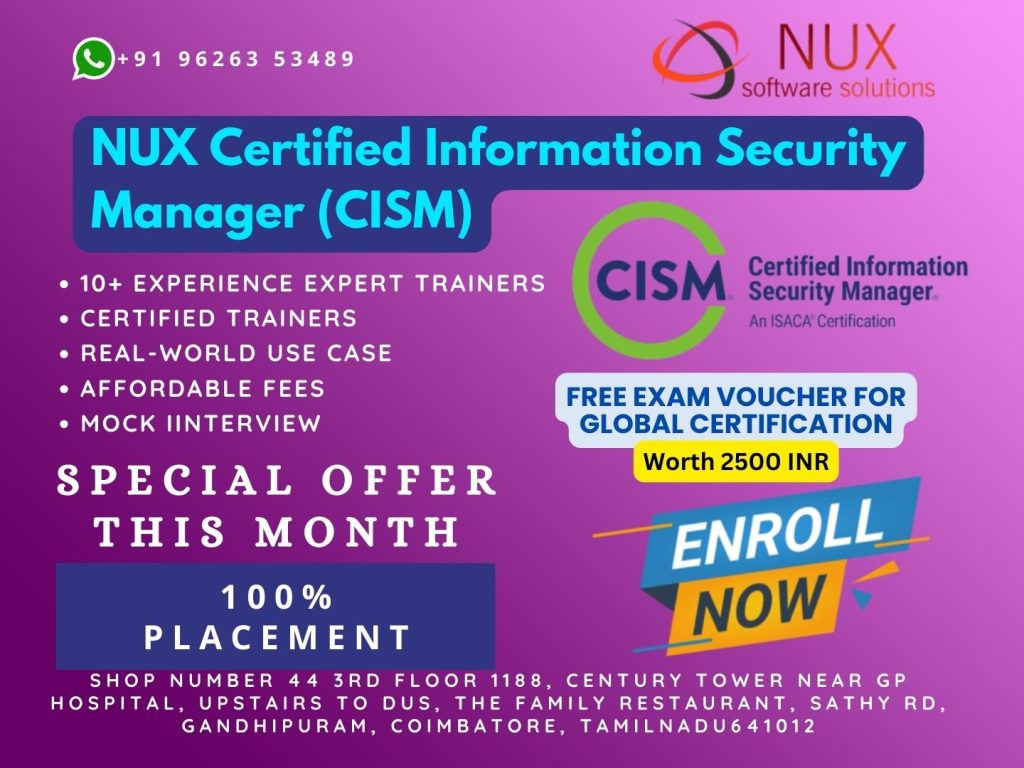Certified Information System Auditor

Certified Information Systems Auditor (CISA) Training in Coimbatore
Course Overview
The Certified Information Systems Auditor (CISA) is one of the most prestigious and globally recognized certifications for IT audit, risk management, and cybersecurity professionals. Offered by ISACA, the CISA certification demonstrates your ability to assess vulnerabilities, report on compliance, and institute controls within an enterprise IT environment.
At Linux Training Center in Coimbatore, our CISA training program provides a comprehensive learning experience that prepares candidates for both the CISA exam and the real-world challenges of IT auditing. With a blend of theory, case studies, and exam-oriented guidance, this course equips professionals to build, manage, and secure modern information systems.
Why Choose CISA?
Organizations today face increasing scrutiny on how they manage information systems, data privacy, and IT risks. The CISA credential proves that you have the skills to audit, control, monitor, and assess IT and business systems effectively.
It is a benchmark certification for professionals pursuing careers in auditing, risk management, security operations, and compliance roles. Holding CISA can boost your credibility, open global job opportunities, and increase your earning potential significantly.
Who Should Enroll?
This course is ideal for:
-
IT Auditors and Assurance Professionals
-
Security Consultants and Analysts
-
Compliance Officers and Risk Managers
-
Information Security Managers
-
IT Governance Professionals
-
Individuals preparing for the CISA certification exam
A background in information systems and basic knowledge of auditing or IT security will be helpful.
What You Will Learn
-
The process of auditing information systems and ensuring governance
-
IT governance, risk management, and compliance best practices
-
Lifecycle management of information systems and IT projects
-
IT operations, service management, and business continuity
-
Protection of information assets, data classification, access controls, and encryption
-
Legal regulations, ethics, audit standards, and professional conduct
-
Real-time auditing techniques and risk-based audit planning
-
Incident response, disaster recovery, and system availability assurance
This course covers all five domains of the latest CISA exam content outline published by ISACA.
Course Highlights
-
Instructor-led training by certified CISA professionals
-
Comprehensive coverage of all CISA exam domains
-
Practice questions, exam simulations, and case-based discussions
-
Real-time insights into auditing tools and methodologies
-
Flexible scheduling: online, weekend, and weekday batches available
-
Personalized mentoring to help with exam readiness and certification strategy
Career Opportunities
With CISA certification, professionals can advance into roles such as IT Auditor, Information Security Auditor, Internal Auditor, Compliance Analyst, Cybersecurity Analyst, or IT Risk Manager. The credential is widely respected by top MNCs, government organizations, and financial institutions.
Why Linux Training Center?
At Linux Training Center in Coimbatore, we combine expert instruction with real-world examples to deliver a result-oriented learning experience. Our CISA training focuses not just on passing the exam but also on developing deep knowledge of audit, risk, and security processes for immediate workplace application.
Course Syllabus
Modules
Chapter 1.INFORMATION SYSTEMS AUDITING PROCESS
– Providing audit services in accordance with standards to assist organizations in protecting and controlling information systems. Domain 1 affirms your credibility to offer conclusions on the state of an organization’s IS/IT security, risk and control solutions.
A. Planning
IS Audit Standards, Guidelines, and Codes of Ethics
Business Processes
Types of Controls
Risk-Based Audit Planning
Types of Audits and Assessments
B. Execution
Audit Project Management
Sampling Methodology
Audit Evidence Collection Techniques
Data Analytics
Reporting and Communication Techniques
Chapter 2. Governance and Management of IT
– Domain 2 confirms to stakeholders your abilities to identify critical issues and recommend enterprise-specific practices to support and safeguard the governance of information and related technologies.
A. IT Governance
IT Governance and IT Strategy
IT-Related Frameworks
IT Standards, Policies, and Procedures
Organizational Structure
Enterprise Architecture
Enterprise Risk Management
Maturity Models
Laws, Regulations, and Industry Standards affecting the Organization
B. IT Management
IT Resource Management
IT Service Provider Acquisition and Management
IT Performance Monitoring and Reporting
Quality Assurance and Quality Management of IT
Chapter 3.Information Systems Acquisition, Development and Implementation
A. Information Systems Acquisition and Development
Project Governance and Management
Business Case and Feasibility Analysis
System Development Methodologies
Control Identification and Design
B. Information Systems Implementation
Testing Methodologies
Configuration and Release Management
System Migration, Infrastructure Deployment, and Data Conversion
Post-implementation Review
Chapter 4. INFORMATION SYSTEMS OPERATIONS AND BUSINESS RESILIENCE
– Domains 3 and 4 offer proof not only of your competency in IT controls, but also your understanding of how IT relates to business.
A. Information Systems Operations
Common Technology Components
IT Asset Management
Job Scheduling and Production Process Automation
System Interfaces
End-User Computing
Data Governance
Systems Performance Management
Problem and Incident Management
Change, Configuration, Release, and Patch Management
IT Service Level Management
Database Management
B. Business Resilience
Business Impact Analysis (BIA)
System Resiliency
Data Backup, Storage, and Restoration
Business Continuity Plan (BCP)
Disaster Recovery Plans (DRP)
Chapter 5.Protection of Information Assets
– Cybersecurity now touches virtually every information systems role, and understanding its principles, best practices and pitfalls is a major focus within Domain 5.
A. Information Asset Security and Control
Information Asset Security Frameworks, Standards, and Guidelines
Privacy Principles
Physical Access and Environmental Controls
Identity and Access Management
Network and End-Point Security
Data Classification
Data Encryption and Encryption-Related Techniques
Public Key Infrastructure (PKI)
Web-Based Communication Techniques
Virtualized Environments
Mobile, Wireless, and Internet-of-Things (IoT) Devices
B. Security Event Management
Security Awareness Training and Programs
Information System Attack Methods and Techniques
Security Testing Tools and Techniques
Security Monitoring Tools and Techniques
Incident Response Management
Evidence Collection and Forensics



